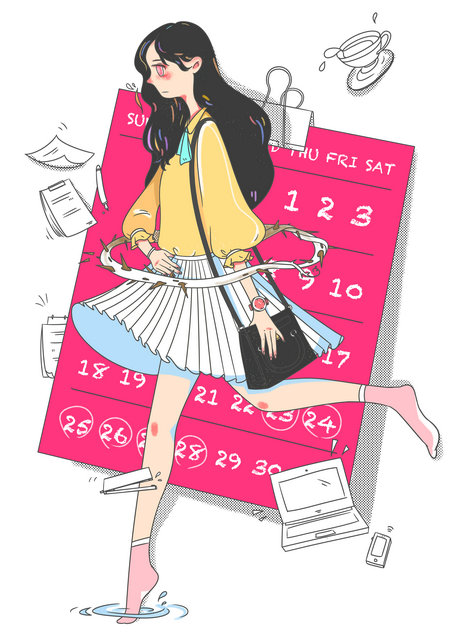A painful reality, period
 |
|
[By Jingxia/For China Daily] |
When 27-year-old marketing specialist Wang Yina applied for two days' leave in September, she didn't cite the excuse of "stomachache". In her application to her boss, Wang said she was having her menstrual period, and cannot bear the pain.
"After Chinese swimmer Fu Yuanhui spoke in front of the camera saying she suffered from menstruation pain and lost a medal during the Rio Olympics, she broke the taboo on talking about period in public. She spoke about a problem shared by many female workers, and I no longer hide the true reason for taking a leave," says Wang.
Her boss, Xiao Liang, a 41-year-old who runs a branding and marketing company with 12 employees, agreed to let Wang take a two-day paid leave on condition that she completed her assignments on time. "I am the father of two daughters, and I have a wife, too. I know menstrual period can be painful," says Xiao.
But Wang's case is rare in today's world of business and commerce, many employers say. First, few women would apply for a paid leave citing menstruation pain as the reason and, second, even if they do, the chances of their applications being accepted are pretty slim, because employers are doing everything possible to control labor costs.
In fact, many female workers say they would not apply for such a leave.
In recent years, some local governments, including those of the Ningxia Hui autonomous region, and Anhui and Shanxi provinces, have introduced policies to protect female workers' right to take a one- or two-day leave if they have a doctor's certificate confirming that their menstrual periods are painful.
However, only a small number of employers say they have received such applications from female workers. Zhang Xiaoju, 46, a resident of Zhengzhou, Henan province, says she has never asked for leave during her menstrual period after she quit her job in a textile factory, which employed about 3,000 female workers, and joined a foreign trading company with 200 employees in 2005.
"In the factory I joined two decades ago there was a clinic. When female workers' menstruation pain became unbearable, they went to the clinic and got a doctor's prescription which allowed them to take a two-day leave. The clinic even had an acupuncture practitioner who helped reduce the pain. In short, the factory took care of almost all emergency medical needs. But when I quit the factory job and joined a trading company in 2005, I figured out menstruation is a personal issue, and you are paid to work, not to take leave simply because you have your period," she says.
Economic development and cultural transformation, ironically, have made "menstruation leave" an impossibility. A woman could even lose her job for asking for such a leave, Zhang says.
Shanghai human resources and social welfare department officials say there is no central government regulation explicitly stating that female workers are entitled to paid leave during menstrual period.
"If the authorities require employers to grant such a leave, they may become more reluctant to hire female workers to cut labor costs, which in the long run may reduce job opportunities for women and hinder the protection of female workers' rights," says a letter from the Shanghai authorities in response to a question on whether Shanghai has included paid "menstruation leave" in its local regulations to protect female workers' rights.
Human resources experts say employers can work out their own paid leave policies so long as they are legal and treat each employee's application for leave on merit.
Zhao Donghai, human resources consultant with Shanghai Zhongzhi Consultancy, a human resources and recruitment company, says enterprises may consider granting "menstruation leave" but it does not have to be paid leave, or the terms for taking such a leave can be negotiated.
"Female workers in certain professions, particularly in the service sector, may not be able to do full justice to their jobs if they suffer from unbearable pain. You can't expect a shop assistant in utter pain to fake a smile to please customers, or a lobby manager in distress to explain details to guests with patience and care. Employers should be more flexible and humane ... and build a healthy relationship with employees by giving female workers menstruation leave," Zhao says.
A research note from global recruitment expert firm Hays says employees are attaching great importance to welfare. As long as employees' basic demands are met and they can afford to pay all the bills, the incentives will be factors as important as their salaries, including work and life balance, recognition and care, says Christine Wright, managing director, Asia at Hays.
















